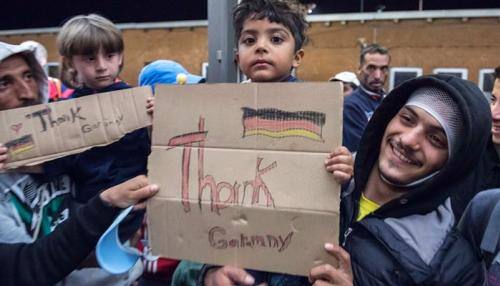- News>
- World
Europe faces `existential` threat from migrant crisis, politicians warn

The migrant crisis poses possibly the most serious threat to the European Union`s existence since the bloc`s foundation as the ghosts of nationalism increasingly haunt the post-war dream of unity, political veterans warn.
Brussels: The migrant crisis poses possibly the most serious threat to the European Union`s existence since the bloc`s foundation as the ghosts of nationalism increasingly haunt the post-war dream of unity, political veterans warn.
While the EU has previously weathered storms ranging from the fall of the Berlin Wall to the eurozone debt crisis, they believe the huge influx of refugees and migrants taps into more dangerous currents that could yet sink the bloc.
Their best hope for the EU is that this threat to a European ideal of solidarity, a dream born from the ashes of World War II, shows that, then as now, an everyone-for-himself approach does not work.
"I really believe it`s the most serious crisis in many years the European Union is facing, probably even the most serious since the beginning of the process of European integration," Jose Manuel Barroso, who headed the European Commission from 2004 to 2014, told AFP.
Barroso warned of "old demons of xenophobia and intolerance" in Europe, saying the migration crisis goes beyond economic issues and is causing splits over whether to admit foreigners of a different religion or race.
"It has an existential nature because it is polarising," the Portuguese statesman said by phone from Princeton University in the United States where he now teaches. More than 1.25 million asylum seekers have poured into Europe since the start of 2015, fleeing war and poverty in Syria, Iraq, Afghanistan and elsewhere in the Middle East and North Africa.
In terms of sheer numbers it is the biggest migration crisis to face the continent since 1945, but political veterans warn that the real danger is the rifts it is causing between the 28 EU member states.
Daniel Cohn-Bendit, a Franco-German former member of the European Parliament, is concerned Europe might not be able to forge the kind of joint solution it crafted recently for the divisive eurozone debt crisis.
"Today, we have the impression there is an unbelievable insensitivity and that it is everyone for himself. That`s very dangerous for the European idea," Cohn-Bendit said.
German Chancellor Angela Merkel, who opened up Germany`s borders to more than a million migrants last year, won praise from Barroso, Cohn-Bendit and others for setting an example for other Europeans.
"Only Merkel has a European stature. The rest are political dwarves," said Cohn-Bendit.
The refusal of several national leaders, for example the hardline Hungarian Prime Minister Viktor Orban, to stick to EU law in handling the flow of migrants is of particular concern to many observers.
Alain Lamassoure, a French member of the European Parliament, said this made it "the most serious" crisis the EU has faced.Since adopting a scheme last September to relocate 160,000 asylum seekers from frontline states Greece and Italy, European Union countries have moved at a snail`s pace, taking in just over 600 people.
Guy Verhofstadt, a former Belgian prime minister and leader of the Liberal group in the European Parliament, warned that the crisis could even "wreck the European project."
In the last few months Europe has seen "the return of political leaders who think that we can resolve problems by hiding behind national barriers," Verhofstadt said.
For example, the passport-free Schengen zone, a pillar of European unity and free travel, could collapse as many of the 26 member countries reintroduce temporary border checks to curb the flow of migrants.
Verhofstadt urged the EU to quickly deploy border guards on the external borders -- a measure member states are trying to draft by June -- as well as to handle asylum and migration issues.
"The only way out is to take a leap forward into deeper European integration," said Verhofstadt, a leading federalist.
But just as the EU`s founding father Jean Monnet wrote in his memoirs that "Europe will be forged in crises", senior figures see hope that the bloc is more resilient than it is sometimes given credit for.
"At the beginning the positions are sometimes very distant but through negotiation and compromise, at the end there will be a common approach," Barroso said.
